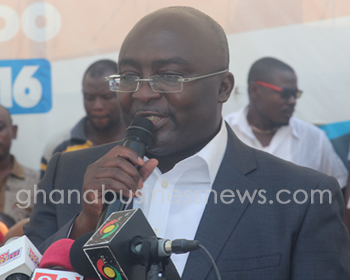Eighteen State-Owned Enterprises record net loss of GH¢791m – Bawumia
 Vice President Dr Mahamudu Bawumia on Tuesday said a Ministry of Finance Report reveals that 18 State-Owned Enterprises (SOEs) made a net loss of GH¢791 million, in addition to over GH¢13 million financial support and loans contracted.
Vice President Dr Mahamudu Bawumia on Tuesday said a Ministry of Finance Report reveals that 18 State-Owned Enterprises (SOEs) made a net loss of GH¢791 million, in addition to over GH¢13 million financial support and loans contracted.
He, therefore, tasked managers of SOEs to pay attention to commercial viability, fiscal impact and corporate governance issues in order to find solutions to their teething challenges.
“As managers of SOEs, the challenges we continue to have over these debts must be at the back of your minds when executing contracts and making commitments with finances, and ultimately fiscal implications for the whole economy.
“While the Public Financial Management Act (PFMA) provides for how financial and commercial transactions by state entities should be done and prescribes sanctions for non-compliance, at the end of the day, it is the decisions you make on a day-to-day basis that will have positive and/or negative impact economy-wide, and it is my expectation that this forum will address the PFMA as part of its deliberations,” the Vice President said.
Vice President Bawumia said this at the opening of a two-day SOE Policy and Governance Forum in Accra to discuss challenges bedevilling those enterprises and propose ideas and suggestions that would enable them to deliver on their mandate.
The forum brought together chief executive officers of the SOEs, regulators, multinational partners, professionals from academia and civil society organisations.
Dr Bawumia said resuscitating the SOEs to contribute significantly towards the Government’s economic transformation strategy remained high on its agenda.
To this end, he said, the State Enterprises Commission and selected SOEs were benefiting from a World Bank Technical Assistant Programme focused on consolidating the state’s ownership role in SOEs into a single entity, improving performance and ensuring effective and efficient service delivery.
In addition, he said, there would be development of key policies for the sectors within which the SOEs operated including ownership, board nominations and financing policies and amendment of Acts establishing relevant SOEs.
This would incorporate corporate governance as well as list some SOEs onto the Ghana Stock Exchange and convert others into limited liability companies.
“It is my hope that you will take advantage of this forum to share with government not your many challenges – which we all know- but your strategies for ensuring financial discipline, exploring access to new sources of capital, transparency and accountability, and improving commercial viability,” he said.
The Vice President said SOEs had been, and continued to be, the heart of the production and delivery of major public infrastructure and services, including electricity, potable water and petroleum products.
“Central to making Ghana the most business-friendly economy in Africa is a private sector working hand-in-hand with an efficiently-run and capable public sector enterprise.
“As the quasi-commercial arm of the State, the role of SOEs in helping achieve the objective of job-creation Public Private Partnerships is pivotal as they extend to all critical sectors of the economy, including energy and power, petroleum, trade, agriculture, manufacturing, housing, railways and aviation,” he said.
Vice President Bawumia said the experiences of other countries showed that efficiently managed SOEs served as catalysts for development, while some mobilised capital for investment in other sectors of the economy and managed natural resources.
“There is, therefore, an expectation that SOEs will be significant partners in Ghana’s economic development for the foreseeable future,” he said.
The Vice President, therefore, charged SOEs to justify continued government support and investments, especially for those that were not making sufficient profit.
Mr Ken Ofori-Atta, the Minister of Finance, in his welcome address, said it was part of the Government’s broader efforts to improve the governance environment and engender high levels of transparency and accountability for the SOEs.
He said the forum was intended to sensitise key stakeholders on government’s strategy and initiatives for the SOEs as well as provide a platform for them to discuss critical developments and other issues of concern.
The Minister expressed the belief that feedback from the forum would not only be persuasive, but would also contribute significantly to the further refinement and effective implementation of the SOE reforms and strategies.
As a result of privatisation, liquidation and dwindling SOEs, the number of SOEs had reduced from 300 in the mid1980s to 86 as at the end of August 2017.
They consist of 46 wholly government owned and 40 joint ventures, 37 of the wholly government owned are commercial companies, with 26 operating as limited liability companies under the Companies Act and 11 being statutory corporations.
There are nine subvented agencies in addition to 40 other companies in which government has either minority or majority shares. There are also 10 mining firms in which government has up to 10 per cent carried interest each.
Statistics from the State Enterprises Commission indicate that 28 of the SOEs employed a total of 32,500 workers and generated a total revenue of GH¢16.2 billion.
Source: GNA
